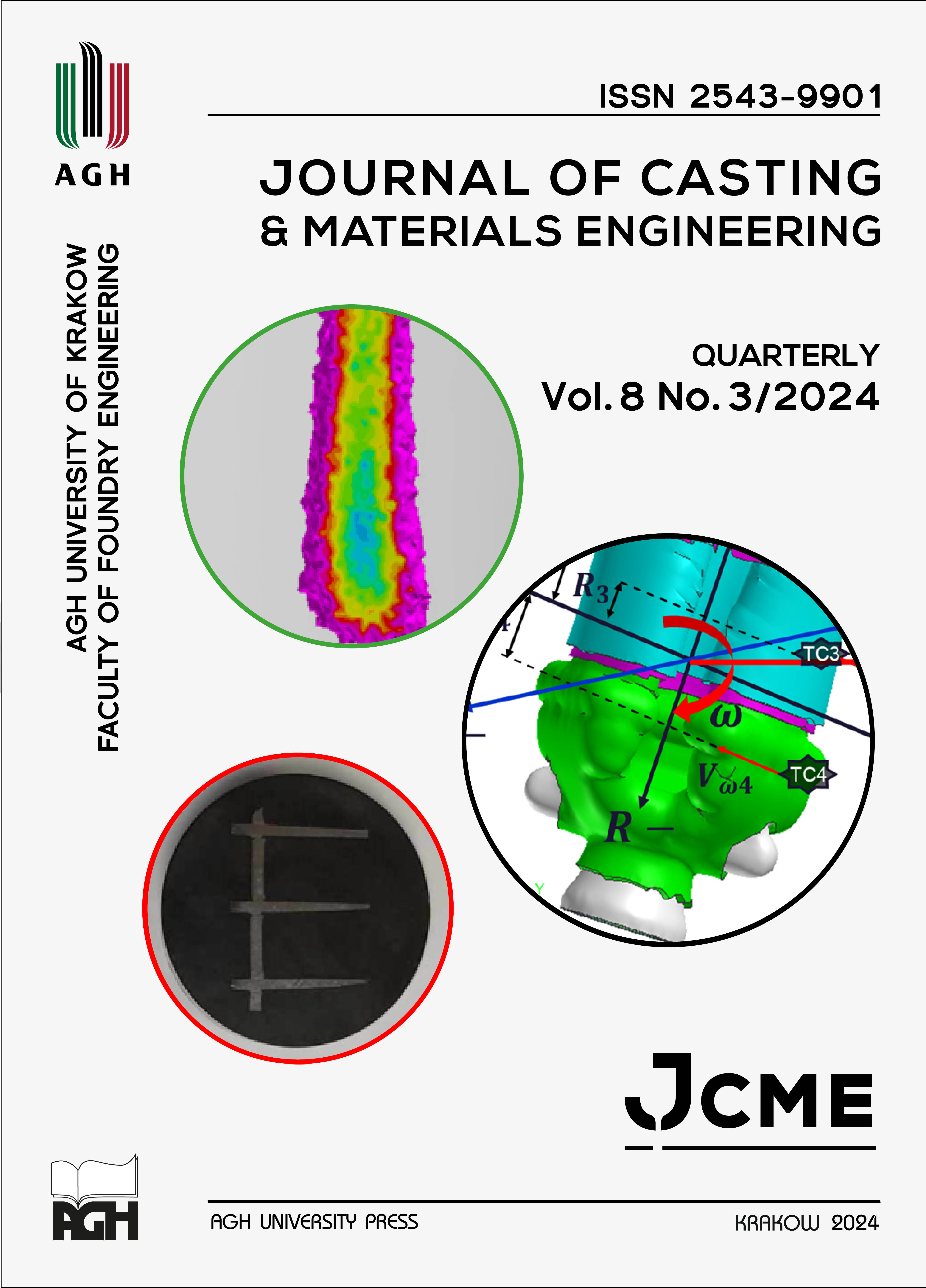Alloys for Hot Dip Galvanising on Thin-Walled Materials
DOI:
https://doi.org/10.7494/jcme.2024.8.3.45Keywords:
zinc, hot deep galvanizing, thin walled elementsAbstract
The article reviews alloy additives to zinc and their impact on the quality of coatings achieved on structural steel. It also analyses the impact of the concentration of acid used for the chemical stripping of raw material on the zinc coating thickness of the steel. The zinc layer thickness changed depending on the concentration of alloy elements in the bath. It was stated that aluminium and bismuth have a low impact on the decrease in zinc coating thickness, while in the case of tin, a small change to the content (from 0.6% to 0.8%) significantly decreased the zinc layer thickness. Furthermore, it was found that, during the hot dip galvanising of steel, particular alloy elements are extracted from the bath. This results in the need to supplement alloy elements through periodical melting in for the purpose of maintaining the assumed bath composition. It was observed that, together with the increase in alloy elements concentration, zinc uptake (galvanised component weight ratio to black component weight) decreases, improving the process economics.
Downloads
References
Malon A., Mikulski S.Z., Oszczepalski S. & Tymiński M. (2013). Rudy cynku i ołowiu. Retrieved from: http://surowce-kopalnie.pl/aktualnosc/69 [accessed: 24.06.2024].
D istribution of zinc consumption worldwide in 2022, by end use. Retrieved from: https://www.statista.com/statistics/240626/share-of-zinc-consumption-by-category/ [accessed: 25.07.2024].
Schulz W.-D. & Thiele M. (2012). Feuerverzinken von Stuckgut. Werkstoffe-Technologien-Schichtbildung-Eigenschaften-Fehler.Bad Saulgau: Eugen G. Leuze Verlag KG.
European Committee for Standardization (2003). EN 1179 – Zinc and zinc alloys – Primary zinc.
Krepski R.P. (1985). The influence of lead in after-fabrication hot dip galvanizing. Proceedings of 14th International Galvanizing Conference. London: Zinc Development Association, pp. 6/6–6/12.
Borhan-Tavakoli A. (1984). Formation and growth of the Delta 1 phase in Fe-Zn system. Zeitschrift für Metallkunde, 75(6), 436–439.
Liberski P. (2013). Antykorozyjne powłoki zanurzeniowe. Gliwice: Wydawnictwo Politechniki Śląskiej.
Radeker W. & Friehe W. (1964). Bath alloy additives and their impact on the quality of the galvanized coating. Proceedings of 7th International Conference on Hot Dip Galvanizing, June 15–19. Paris. Paris: Pergamon Press, pp. 167–178.
Kania H. & Liberski P. (2008). Struktura i kinetyka wzrostu zanurzeniowych powłok cynkowych otrzymywanych w kąpielach z dodatkiem cyny. Inżynieria Materiałowa, 3, 149–153.
EN ISO 14713-2:2020 – Zinc coatings – Guidelines and recommendations for the protection against of iron and steel in structures – Part 2: Hot dip galvanizing.
Taylor M. & Murphy S. (1997). A decade of Technigalva. Proceedings of 18th International Galvanizing Conference. Birmingham: EGGA.
Schubert P. & Schulz W.-D. (2001). Der Einfluss von Zinkbadzusatzen. Forschungsbericht FB410/01/01 des Instituts fur Korrosionsschutz. Dresden.
Dreulle N., Dreulle P. & Vacher J.C. (1980). Das Problem der Feuerverzinkung von siliziumhaltigen Stahlen. Metallwissenschaft und Technik, 34(9), 834–838.
PN-EN ISO 1461:2011 – Powłoki cynkowe nanoszone na wyroby stalowe i żeliwne metodą zanurzeniową. Wymagania i metody badań.
PN-EN ISO 6507-1:2007 Metale. Pomiar twardości sposobem Vickersa. Część 1. Metoda badań.
Marder A. (2000). The metallurgy of zinc-coated steel. Progress in Material Science, 45(3), 191–271.
Downloads
Published
Issue
Section
License
Copyright (c) 2024 Piotr Żabiński, Beata Leszczynska-Madej, Grzegorz Włoch, Piotr Lewartowski

This work is licensed under a Creative Commons Attribution 4.0 International License.


